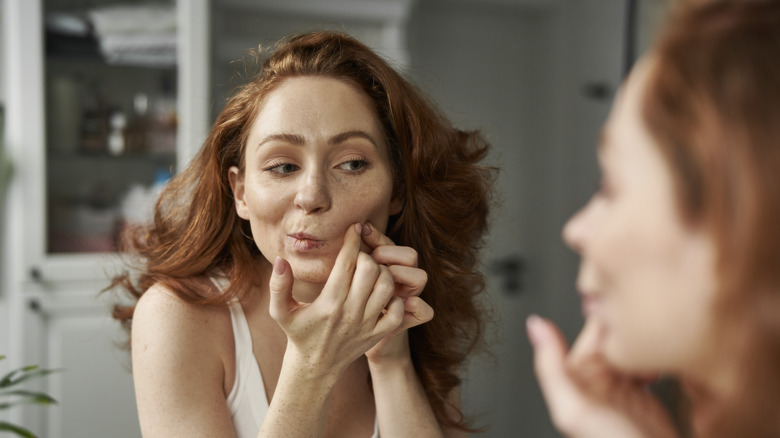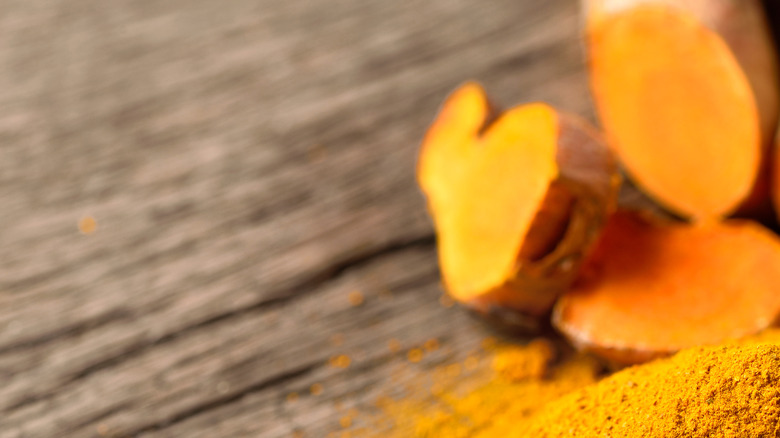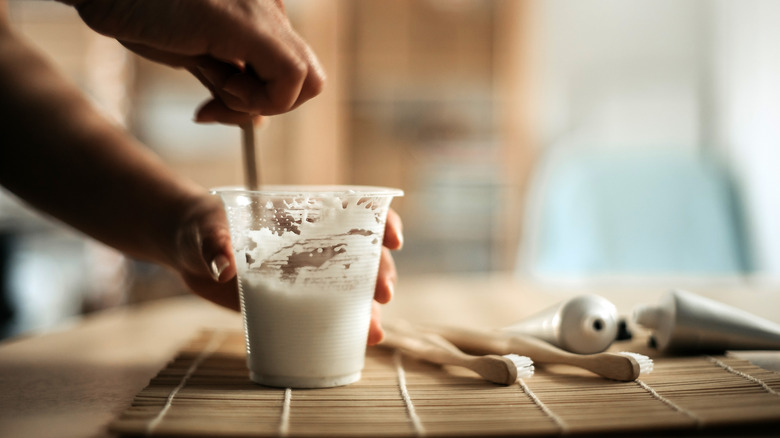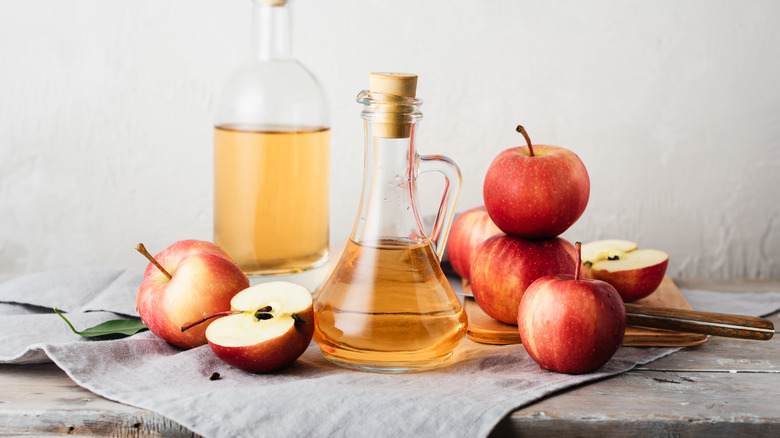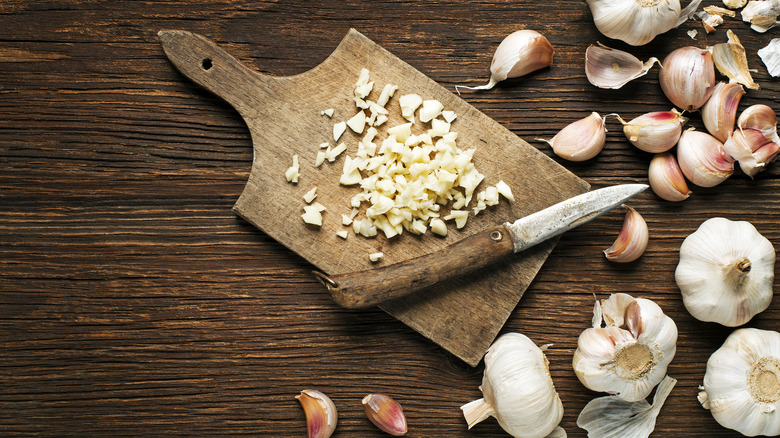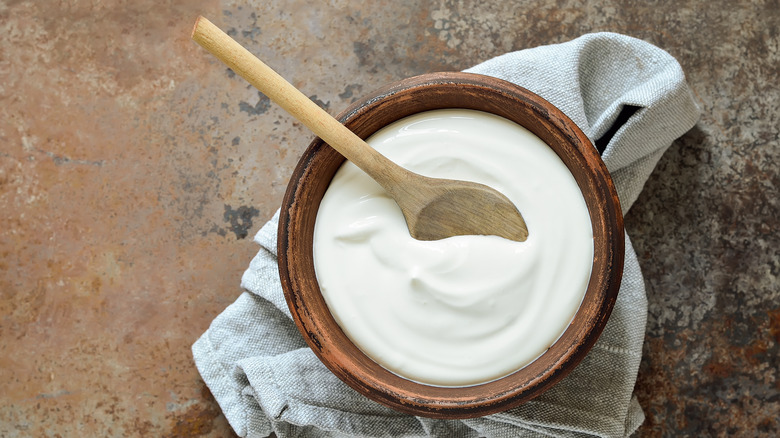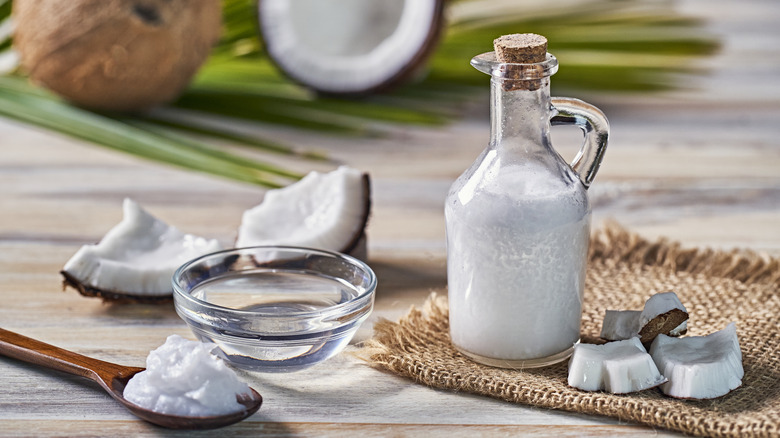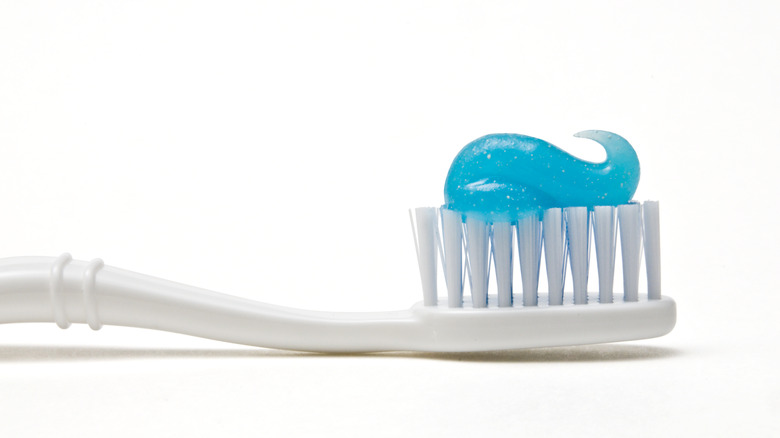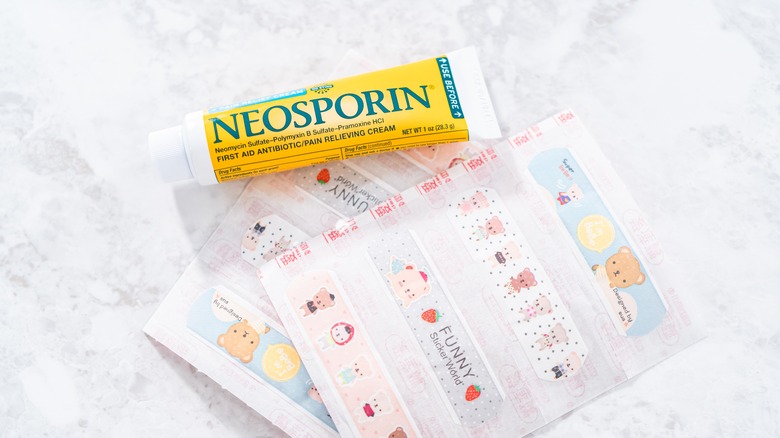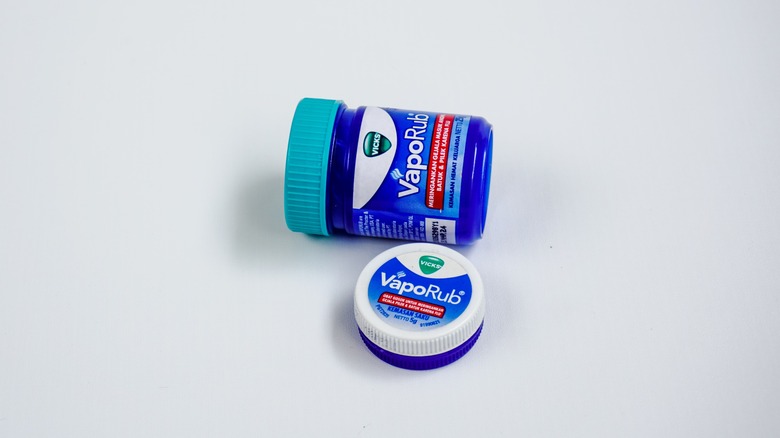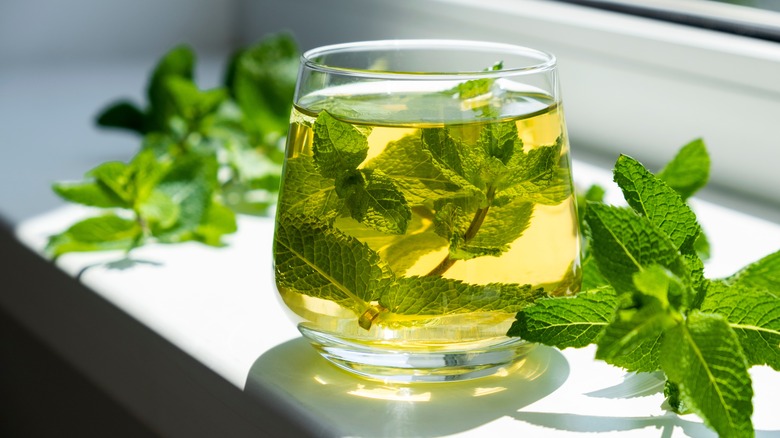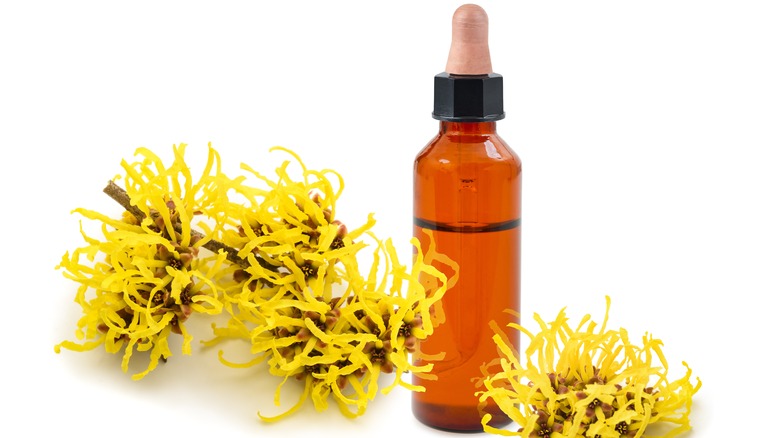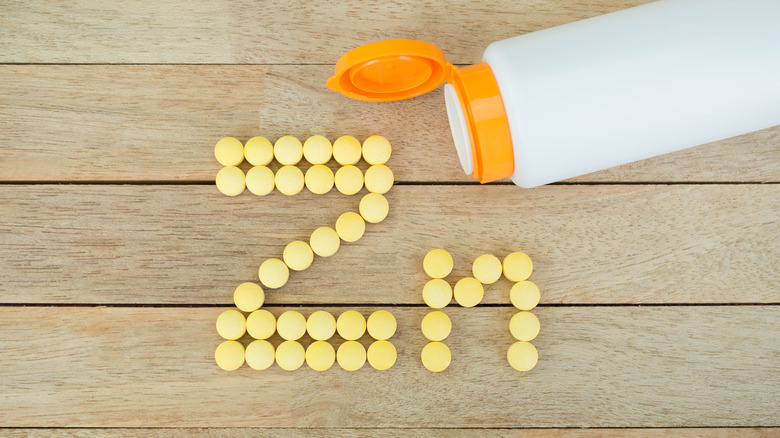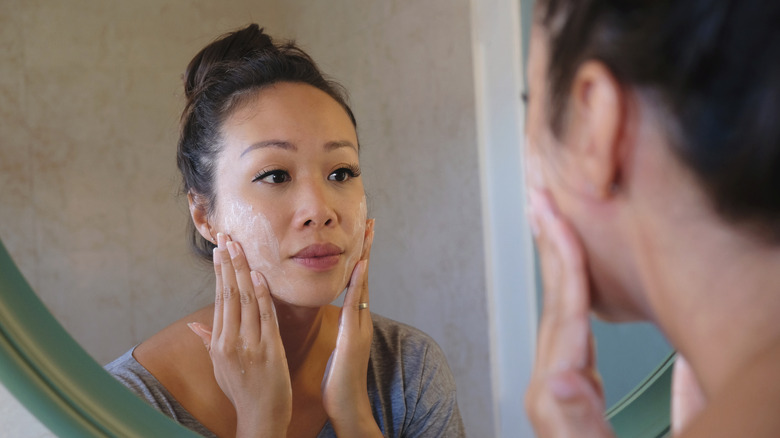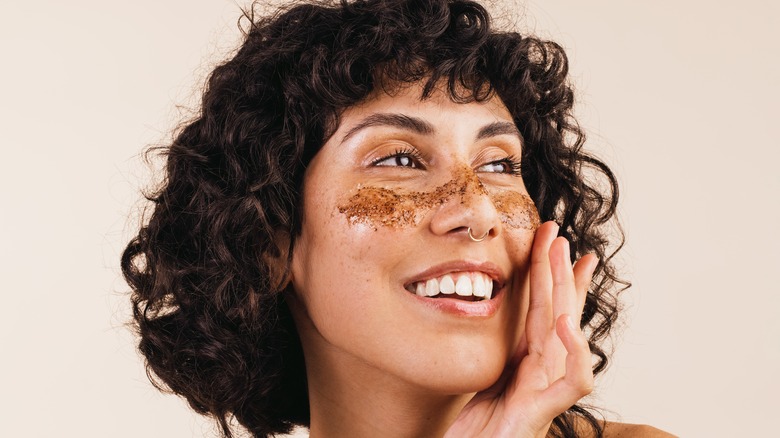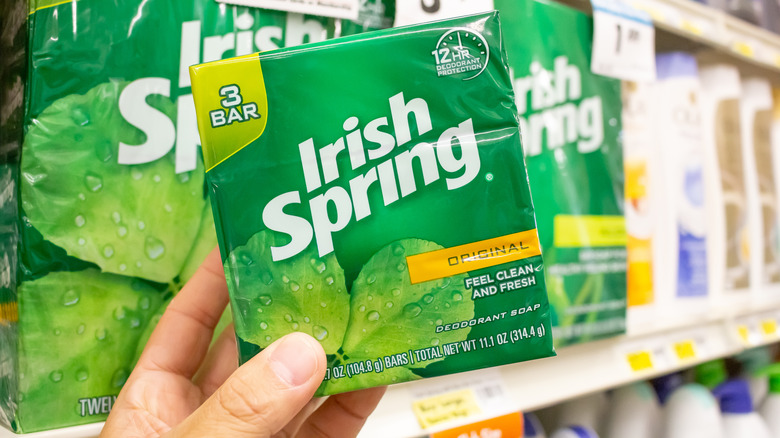Debunking The Most BS Acne Solutions (The Toothpaste Trick Is A Lie, FYI)
We've all been there. You're sitting at lunch and an itch begins to throb on your face. You lift a finger to scratch and — uh oh — a pimple is brewing.
It seems breakouts always erupt at the most inauspicious times — right before a meeting, date, or a girl's night out — when there's never enough time to let them run their course. And so, in a frenzy, we look up "quick remedies for acne," only for the search engine to generate dozens of DIY solutions from authors who swear their concoction of spices and gels is the premier recipe for obliterating that red sore on your face (or back, or chest, or... down there — hey, it happens).
While the recipes you're reading may have worked for those respective bloggers at specific times, there is no promise they will work on you at any time. These home remedies oftentimes lack empirical evidence to support their efficacy. Without a thorough understanding of the conditions causing your blemish, the ingredients you are blending, and their interactions, you could end up doing more harm than good. To help you steer clear, we're getting to the bottom of these so-called acne "solutions," that lack sufficient support from the scientific community.
Turmeric isn't the catch-all some claim it is
Long-used in South Asian ayurvedic practices and religious traditions, turmeric recently gained notoriety as a nutritional "powerhouse" in Western culture. From lattes to smoothies, health influencers will have you believing that the vibrant orange-yellow spice can cure all. While it is true that turmeric possesses many beneficial properties, to claim it is a treatment for acne may be a stretch.
Skincare gurus began to tout turmeric as a breakout banisher after learning of its anti-inflammatory and antiseptic uses in traditional Asian medicinal practices. While there is merit to these longstanding beliefs, when you compare the performance of turmeric as an acne treatment against FDA-approved products, evidence is circumstantial. In fact, per a 2016 review published in Phytotherapy Research, researchers asserted we need to conduct more studies to assess the effectiveness of turmeric against acne.
Since 2016, there have been more assessments into the practical applications of turmeric in skincare, but rarely have these studies focused on its actions against acne specifically. Instead, they often probe its general properties and extrapolate that positive results could be applied as an acne treatment. One study from January 2023 did deem that fermented turmeric kombucha unambiguously displays anti-acne properties, but how many of us have fermented turmeric kombucha ready in our fridges? The reality is, we're more likely to slather regular turmeric powder and water on our pimples and hope for the best... which, based on the lack of science, is unlikely to happen.
Baking soda might imbalance your skin's acidity
If baking soda can safely polish your teeth, can't it also polish up your skin? Not so fast — you could be jumping the gun with that one. Although baking soda contains antibacterial properties that are conducive to oral hygiene, may be too harsh for your skin.
Known sodium hydrogen carbonate amongst scientists, baking soda has a pH far higher than human skin, according to Dr. Jaspreet Oberoi. pH, if you recall from science class, is a measure of acidity. The lower a substance's pH measures, the more acidic it is. Typically, our skin falls on the more acidic end of the scale, while baking soda is more alkaline. Dr. Oberoi cautions against applying baking soda (or any DIY treatments) to the skin because its application can unbalance your skin's natural acidity. This could create further irritation, which is the last thing anyone needs when trying to remove a pimple.
Even worse, when tested in a controlled environment, one 2013 study showed that baking soda formulas weren't effective against acne. At that point, you're better off splashing water on your face than using baking soda to reduce the appearance of pimples. However, the researchers recommend dabbing benzoyl peroxide on affected spots as a tried and trusted acne treatment.
Apple cider vinegar warrants a fully equipped laboratory
The biggest issue with most homemade skincare remedies is you can never be sure of the concentration of the active ingredient you are using. FDA-approved skincare products are formulated using tight guidelines and precise equipment... and how many of us have a microscope in our bathroom cabinet? On top of that, without regulations to follow, it's impossible to know how long and how best to apply your "fix".
Apple cider vinegar (ACV) is one such "holy grail" that is super difficult to work with. Due to its highly acidic nature, improper application could lead to rashes or even chemical burns. One report from the Journal of the American Academy of Dermatology stated a child developed severe burns after his mother applied cotton swabs soaked in apple cider vinegar to cuts on his leg. Of course, most DIY hacks inform readers to dilute their ACV before applying it to their skin, but without the adequate equipment to measure, it's a guessing game to determine if you've diluted the ACV to the right percentage needed for your skin and acne type. Second, even diluted ACV soaks have been shown to lead to irritation. This is probably why some physicians recommend avoiding ACV all together as a treatment for skin conditions.
Fresh garlic could burn you
Speaking of burns, here's another spicy remedy to keep your skin away from. Allicin is the chemical that gives garlic its spicy sensation, which while gratifying in soups and stir-fries, could be problematic when used as a skin tonic. Ironically, it is this same component that gives garlic its dietary antibacterial and anti-oxidative properties. The discovery of these properties has wrongly led some to believe they could be transferred topically as well, and may be why garlic is sometimes recommended as a "quick fix" for acne.
However, much like ACV, fresh garlic has high potential to cause a burn when lathered or rubbed onto your face or body, which is exactly why scientists warn against applying fresh garlic to the skin. Imagine chopping up a clove of fresh garlic and squeezing it onto a pimple. If it's potentially irritating on healthy skin, the consequences could be catastrophic on broken out skin! All that to say, save the garlic for your cooking.
Yogurt is best consumed, not worn as a mask
Okay, if spices are too strong for the skin, moving to the opposite end of the spectrum is a step in the correct direction, right? Not necessarily.
Studies have shown there is a direct correlation between what you put in your stomach and what shows up on your skin. A healthy gut microbiome is often reflected through clear skin (but remember, this assumes that you aren't living with hormonal or other autoimmune conditions that contribute to acne flares). Dietary probiotics, like yogurt, play an essential role in balancing gut health.
By that logic, some have proclaimed that applying probiotic-rich foods to the skin should have the same effects as consuming them. Unfortunately, per Topical Probiotics in Dermatological Therapy and Skincare, there isn't enough evidence to support the claim that the benefits of probiotics can be transferred through topical application. Since research in this area is still in its infancy and we don't know enough about potential side effects, one would be ill-advised to slather yogurt on a pimple in hopes it will disappear. So, for now — skip the yogurt masks and cover up your pimple with a patch instead. If you want extra coverage, the patch will create a physical barrier allowing you to wear makeup to conceal your breakout too!
Egg white masks don't work on your skin's pH
Egg whites, like yogurt, are often touted as good foundations for DIY anti-acne masks. This is because they generally make good bases for holding together all the components a homemade remedy. Unfortunately, there is little to no evidence supporting their efficacy against breakouts. While they do contain active enzymes that demonstrate antibacterial properties, one 2021 study showed that these enzymes are most effective at pHs of 6 to 6.5, but the skin's pH usually sits at 4.7.
Unfortunately, enzymes are extremely temperamental, meaning that they don't work under conditions that differ even slightly from their optimal ranges. This means that applying them to your skin renders them ineffective and destroys any of their anti-acne potential. Instead, dermatologists recommend enzyme and acid masks that are chemically formulated (and FDA-approved) to gently exfoliate and remove clogging substances from your acne-ridden skin.
Coconut oil can clog your pores even further
Coconut oil really does seem like the holy beacon of beauty and health. It can be used for cleansing, deep conditioning, and moisturizing — but wait, NOT on your face! Coconut oil is highly comedogenic, which means it is very likely to clog your facial pores. The reason it has likely been recommended as an anti-acne treatment because it is found to have bacteria-fighting properties. Unfortunately, when applied and left on the face for a prolonged period of time, its comedogenic properties overpower any benefit of its anti-bacterial ones. The pores on your face are more sensitive than the ones on your body, due to a thinner epidermal layer, which is why some people may still find it safe-to-use on their body without it causing a breakout. However, it should not be used in your facial skincare routine, let alone as an anti-acne treatment! In fact, we now know from research that coconut oil perpetuates folliculitis, so it can actually have the opposite effect and aggravate acne. This is an even bigger concern when it is used in DIY remedies, can't be formulated at a concentration where its comedogeneticity isn't as impactful to the face (via Acne Einstein).
Toothpaste can increase irritation
The "toothpaste" hack for breakouts is about as old as, well, most people reading this. We grew up seeing it on TV, reading about it in magazines, and early beauty Youtubers raved about it too.The claim was that the baking soda, hydrogen peroxide, and/or alcohol, which many toothpastes are formulated with, would draw out the oil and sebum in the pimple, drying it up, thereby diminishing its size. Unfortunately, most of this was heresy. Per Hackensack Meridian Health, The American Academy of Dermatology Association actually recommends against using all of these ingredients as acne treatments, individually or combined. Yes, the ingredients are drying, but they can irritate your skin increasing its sensitivity to future breakouts.
One 2014 study evaluated five different household toothpastes for their anti-acne properties. Of these, only Colgate brand showed promising results, but even application of that product caused irritation and itching, especially in people with darker skin tones. The researchers hypothesized this could have been due to bleaching agents in the toothpaste. However, even for those with lighter skin pigmentation, researchers advised against using toothpaste as a home acne remedy, since most toothpastes contain fluoride, which could cause irritation or skin rashes.
Save the neosporin for cuts, scrapes and burns - it says so right on the box
Wounds are wounds are wounds, right? Wrong. Though pimples are eruptions in the skin's epidermal barrier, they are physiologically different from other skin lesions like cuts, scrapes or burns. Think about it, these three are formed due to blunt impact from the environment, while acne forms from the inside. By that logic, it would be counter-intuitive to use an ointment like Neosporin on pimples. (But we understand, desperate times call for desperate measures). Sadly, Neosporin could make matters worse as many of its components, as indicated on the label, can cause side effects including increased redness or hives. It's better to let a pimple run its course or talk to a dermatologist about treatments for persisting acne.
Speaking with a professional is exactly what the researchers from one 2016 study recommend. Per the report, haphazardly using anti-bacterial ointments like Neosporin to treat acne could potentially cause bacterial resistance, thus creating stronger, more persistent types of acne in the future —the opposite of what you intend from a DIY remedy.
Keep Vicks VapoRub for what it was intended -- coughs and aches
As turmeric is to skincare, Vicks Vaporub is the quintessential cough and cold cure in many households. But, just like with turmeric, there is little evidence to support the belief that this aromatic rub will deliver desired results for pimples.
Dr. Mitchell Manway tells Healthline that although Vicks Vaporub contains some ingredients that could provide temporary acne relief, it contains just as many ingredients that counteract those effects. For one, the base of Vicks, and what gives it its viscous texture, is petroleum jelly. Since it is so thick, it could potentially trap dead skin and oil in your pimple, clogging the skin's follicles even further, leading to a more inflamed appearance, or more acne. But, it doesn't stop there. According to Dr. Tsippora Shainhouse, who also spoke with Healthline, other ingredients in Vicks, like menthol, can irritate sensitive areas of the skin.
Mint isn't a bacteria-killer
Okay, so to be honest... we have no idea where the myth that 'mint can be used as an acne fix' came from. If we had to guess, this claim descended from another old wives' tale that over-exaggerated this herb's antibacterial and anti-inflammatory properties. Contrary to that belief, however, one 2022 study revealed that only a few of the chemical components in mint have even been explored in scientific literature, which means we have a very limited understanding of how mint can actually affect, let alone benefit, our skin health.
Of these explorations, most have focused on the effects of mint essential oil against acne, which this 2010 study compared to a dozen other essential oils. Shockingly, they reported it was actually the oil least effective at killing bacteria. In fact, mint essential oil didn't appear to display any anti-bacterial activity even after two hours — a far cry from a quick fix!
Witch hazel could work... if you've got magic powers
Hamamelis virginiana, the classical name for witch hazel, has been long-used by Indigenous populations in the Americas for its medicinal properties. When used in topical remedies, its astringent nature was seen to reduce oil on the skin. Extrapolating from this, the beauty industry began to popularize this ingredient in the late 2010s as a treatment for acne. While there could be merit to these claims, the science just isn't in yet.
In fact, this 2022 study was the first to show the statistically significant effects of witch hazel against acne, but it concluded that the ingredient only produced results against symptoms of inflammation and redness, not the actual anatomy of a pimple. So while the pimple looked like it had been reduced on subjects, it remained on the skin. That doesn't mean witch hazel has to be written off completely. There's definitely potential here if you're mainly concerned about minimizing the redness around a breakout. However it's definitely not a cure and you'll still have to incorporate other measures to destroy the pimple at its root.
Supplementing with zinc has too many drawbacks
Some breakouts last for more than a day or two, and so we need more long-term remedies. Since skincare starts on the inside, you may look to supplement your diet in hopes of remedying your persisting acne.
There are proposals that zinc's anti-inflammatory properties can have anti-acne effects. But supplementing zinc could be more painful than its worth. Some research has shown zinc supplementation can lead to nausea, vomiting, and diarrhea. Participants in one study (all of whom had acne) were enlisted to take zinc supplements over a 12-week period. They made no other changes to their diet and lifestyle. Some experienced side effects so bad that they had to withdraw their participation. On top of that, for those who managed to last long enough to see results, zinc wasn't even effective against all types of pimples. Sounds like too much to gamble on to claim this is a cure worth trying.
Fish oil supplements are ineffective, even in the long-term
Omega fatty acids have definitely earned their claim-to-fame for their health benefits. In a 2012 study, researchers determined a link between lower incidences of acne in populations that ate diets richer in omega fatty acids. This has likely led them to some hypothesizing that fish oil could be used as a cure for or deterrent against acne breakouts.
Sadly, just like zinc, fish oil performs inconsistently against acne. The 2012 study required participants with varying degrees of acne to take fish oil pills regularly for three months while making no other lifestyle changes. They found that changes to acne presentation after 12 weeks of consistent fish oil supplementation were inconsistent and not significant enough to warrant fish oil as an effective acne treatment. For some, acne stayed the same, but for others, acne even ended up worsening.
Washing your face more than twice a day is drying
Okay, so herbs, spices, ointments and mineral supplements don't work. How about good old-fashioned face-washing? Dermatologists are always telling us the benefits of cleansing daily to remove unwanted and excess oil and sebum from the pores. So washing more means obliterating more dirt, right?
Unfortunately, it's not that simple. Your skin's epidermis thrives on a delicate balance of oil and sebum, which actually exist to protect your skin from many environmental elements. Dermatologist Dr. Sajiv tells Real Simple that washing twice a day is best for removing buildup without drying the skin. Anything more can strip your skin of its natural oils, encouraging your glands to overproduce oil and sebum, reinforcing the original problem. Not only that, if your acne is caused by internal conditions like hormonal imbalances, cleansing your face may be too superficial of a treatment to get to the root cause. This is why consulting with a professional to curate an individualized skincare regimen is the prime course of treatment.
Over exfoliating could have the opposite effects
Most of us, when we see a new pimple, instinctively think that scrubbing it away is the best way to demolish it. While physically exfoliating the bump may temporarily remove it and any sebum underneath, the physical wear and tear can create a rupture that is more vulnerable to new dirt entering the skin from the environment, promoting the appearance of more or worsened acne.
Physical exfoliants are highly abrasive and most people apply way too much pressure when scrubbing. Instead of trying to exfoliate your skin off, the American Academy of Dermatology Association recommends washing gently with a cleanser. If you've already got your cleansing regiment down pat, incorporate a chemical exfoliant instead. Counter-intuitively, chemical exfoliants are gentler on the skin, because they don't encourage you to scrub your face, and can be specifically formulated for acne. Popular choices include salicylic and glycolic acids.
Abandoning a skincare routine altogether will not restart your skin
We've all seen the memes antagonizing folks who have 'flawless skin' despite not practicing any skincare regimen. On top of that, recently the word "chemical" has gotten a bad rep from the 'go natural movement.' In reality, everything around us is comprised of chemicals and skincare products are specifically formulated to chemical concentrations that are clinically proven to be beneficial and active against the conditions they aim to treat. So, while you may be tempted to abolish a skincare routine altogether — wait.
Known as the "caveman" or "neanderthal" method, proponents argue that our historic ancestors didn't pile on layers of toners, serums, and creams on their faces, and that doing so nowadays is antithetical to our skin health. Well, cavemen also weren't exposed to as much pollution and UV radiation centuries ago. Plus, who's to say cavemen didn't suffer from acne? We don't have any photographic evidence to believe they lived with clear skin all the time. The caveman regimen has no empirical evidence to stand on. In fact, these days, we know that inadequately cleansing your face will lead to buildup that can cause skin issues sooner or later.
In fact, dermatologist Dr. Gray claims that going "natural" might actually be the worst skincare advice to give someone. The myth that applying "humanmade chemicals to your skin is harmful" is just that — a myth.
